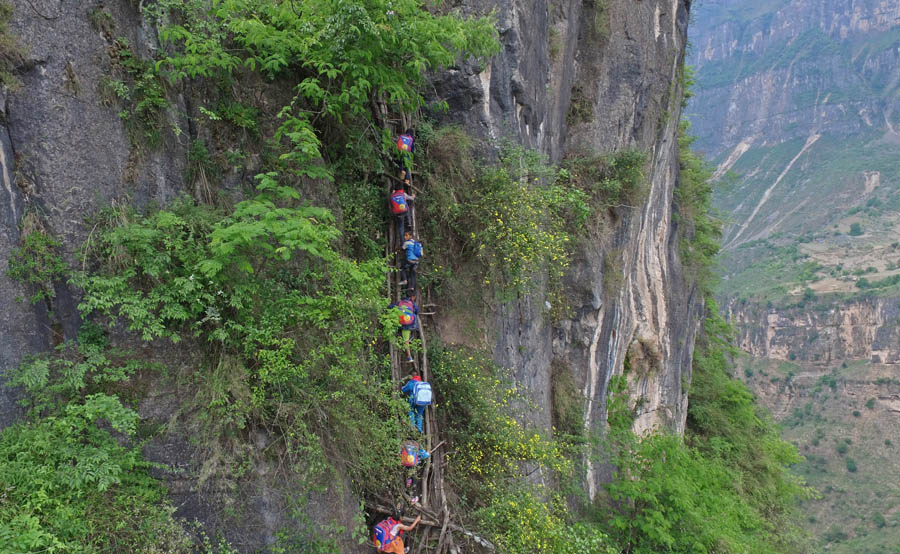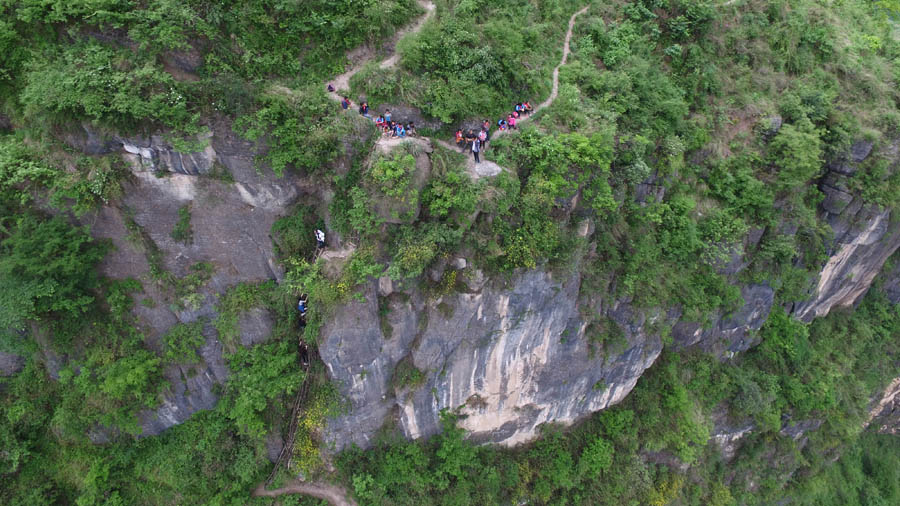Not For The Faint of Heart
"It is impossible to build a school on the mountaintop because the area is too small. The school down the mountain has reliable power and water supplies and the living conditions are much better than in the village."
"The government and the families try their best to ensure every child can receive education, because we all know knowledge can help them live a better life."
Api Jiti, Party chief, Atuler village, China
"Our main income is from the pepper and walnut. The buyers know we are from the mountaintop village and that we do not want to carry the pepper or walnuts back, so they offer a much lower price - we have no choice."
Atuler village head, Er Dijiang
 |
| Children climb up a cliff on a vine ladder to an isolated village on the top of a mountain in Liangshan Yi autonomous prefecture, Southwest China's Sichuan province, on May 14, 2016. Atule'er village, home to 72 families, is known as "cliff village" because its vertical distance to the ground is 800 meters. The routes leading to the outside world are 17 vine ladders. [Photo/VCG] |
This is the establishment of paying a 'fair price' by taking advantage of circumstances deleterious to the seller, advantageous to the buyer, and leaving people in the village of Atuler in the mountainous west to live on a straitened income of less than a dollar a day. Vast multitudes of rural dwellers in China have always lived in endemic poverty, and China has made great strides in an astonishingly short period of time to bring many within its immense population of 1.3-billion people out of starvation.
It is, for the most part, urban dwellers who have been transformed by China's emergent economy to a middle-class lifestyle, and it was ever thus. It is typical that farming communities remain disadvantaged while much of the country, particularly its hugely populous metropolises are brought into modernity and comfort still denied those in the vast countryside. Despite their remote location and a life of privation, attaining an education holds high value for Chinese, to their immense credit.
During the settler days of North America when children living in the countryside attended one-room schoolhouses and had to reach them daily through exerting themselves physically to walk long distances, the determination to ensure that all children receive at least an elementary education bespoke the values of the society. Those days are long past, however, with readily accessible educational opportunities mandated by law.
The village of Atuler in Sichuan province is remote from such access to school for their children. Access to any point for any of the villagers is a difficult problem. To leave the village means that one must descend an ancient set of stairs comprised of a set of rope ladders beside a perpendicular wall of sheer rock, the side of the mountain. There, shopping for food is far more complex than driving to the nearest supermarket.
Anyone setting out for a marketplace in another village to bring back food for their family must access that same staircase, reputed to be hundreds of years old, according to Chen Jigu, one of the villagers, who explained: "We replace a ladder with a new one when we find one of them is rotten". The rattan series of ladders comprising the whole is secured against the mountainside enabling a descent of 800 metres.
 |
| A bird's-eye view of kids climbing cliff, May 14, 2016. It takes a young and agile villager about one and a half hours to climb up the mountain, and even longer for kids. When the whether is bad, no one goes out of the village. [Photo/VCG] |
Led by an adult, to climb up the cliff takes about two hours and the descent about one and a half hours. If someone from the village needs medical attention and is too ill to make the descent and ascent themselves, someone from the village ties that person onto their back to descend the cliff, with the assistance of two other villagers.
"It will cost about 60 million yuan to build a road connecting Atuler and two other remote villages. But the country government only has 200,000 yuan for the project", explained Jike Jinsong, an official of Zhaojue county government. Relocating the village down the mountain is not feasible since the village owns the land where they are now located and by moving they would be abandoning their land.
 |
| Children climb a vine ladder on their way home, May 14, 2016. The children study at a school at the foot of the hill and go home twice a month. [Photo/VCG] |

0 Comments:
Post a Comment
<< Home